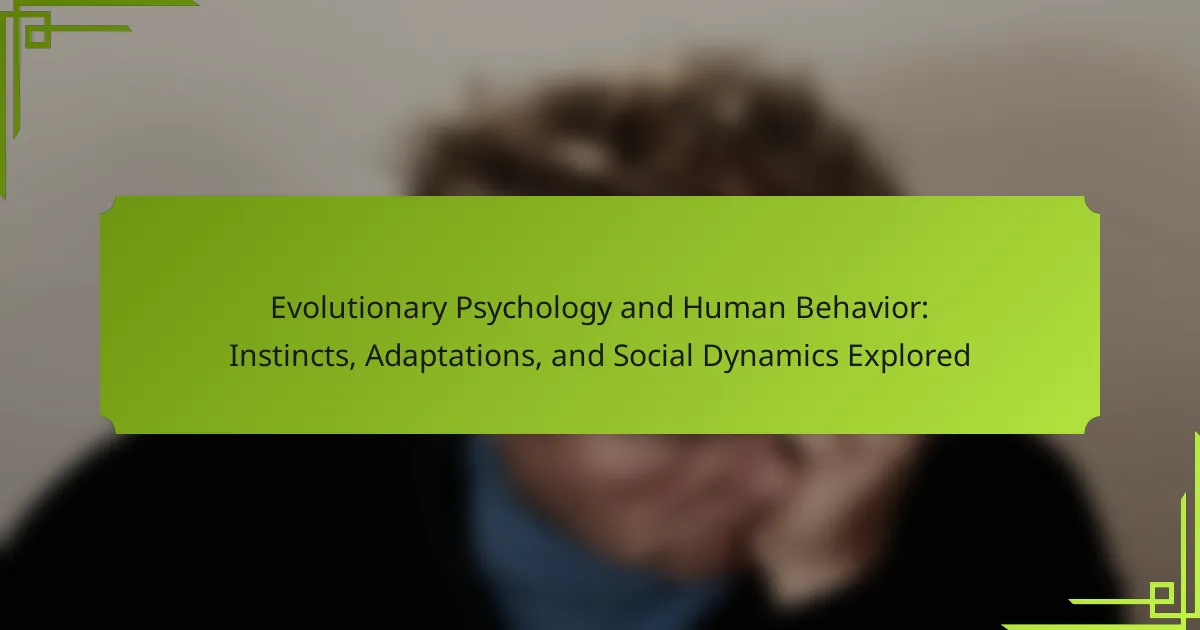Understanding the principles of evolutionary psychology can enhance personal relationships and provide insights into human behavior. This field explores instincts that drive survival and reproduction, examines unique adaptations in social dynamics, and discusses rare traits like altruism and advanced cognitive abilities. By analyzing these elements, we can better understand motivations and improve communication within relationships.

What is Evolutionary Psychology?
Evolutionary psychology examines how human behavior is influenced by evolutionary processes, focusing on instincts, adaptations, and social dynamics. This field posits that many psychological traits are evolved adaptations shaped by natural selection. Key attributes include the role of instincts in decision-making, the impact of social dynamics on behavior, and how adaptations influence survival and reproduction. For instance, understanding parental investment reveals insights into mating strategies and social bonds. Evolutionary psychology provides a framework for analyzing human behavior through the lens of our evolutionary history.
How does Evolutionary Psychology explain human behavior?
Evolutionary psychology explains human behavior as a product of adaptive traits shaped by natural selection. It posits that instincts and social dynamics evolved to enhance survival and reproduction. Key adaptations include cooperation, mate selection, and parenting strategies. These behaviors reflect underlying psychological mechanisms developed over millennia to address environmental challenges. Understanding these aspects provides insights into contemporary human interactions and societal structures.
What are the key principles of Evolutionary Psychology?
Evolutionary psychology focuses on how human behavior is influenced by evolutionary processes. Key principles include the role of instincts in survival, adaptations to social environments, and the significance of reproductive strategies. These principles help explain behaviors such as altruism, aggression, and mate selection. Understanding these concepts provides insights into the underlying motivations driving human actions today.

What are the universal instincts in human behavior?
Universal instincts in human behavior include survival, reproduction, and social bonding. These instincts drive actions and decisions shaped by evolutionary pressures. For instance, the instinct for survival manifests in risk assessment and resource acquisition. Reproductive instincts influence mate selection and parenting behaviors. Social bonding instincts foster cooperation and group dynamics, essential for community survival. Understanding these instincts reveals insights into human motivations and social interactions.
How do survival instincts influence decision-making?
Survival instincts significantly influence decision-making by prioritizing immediate needs and threats. These instincts, shaped by evolutionary psychology, drive behaviors that enhance survival and reproductive success. For instance, the fight-or-flight response activates in dangerous situations, leading to quick, instinctual choices. Research shows that individuals often rely on these instincts in high-stress environments, resulting in decisions that may overlook long-term consequences. This instinctual decision-making can also affect social dynamics, as individuals assess risks and benefits in group settings, influencing cooperation and competition.
What role does social bonding play in human evolution?
Social bonding has been crucial in human evolution, enhancing survival and cooperation. Strong social ties fostered group cohesion, enabling early humans to collaborate in hunting and gathering, thus increasing food security. Research indicates that social bonds can reduce stress and improve mental health, which may have provided evolutionary advantages. Additionally, social bonding facilitated the sharing of knowledge and skills, promoting cultural transmission and innovation. This interconnectedness has shaped human behavior and societal structures, underscoring the significance of social dynamics in our evolutionary history.

What unique adaptations have emerged in human social dynamics?
Unique adaptations in human social dynamics include increased cooperation, enhanced communication skills, and the development of complex social hierarchies. These adaptations arose from evolutionary pressures that favored group cohesion and resource sharing. For example, the ability to empathize and understand others’ emotions has strengthened social bonds. As a result, humans can form larger, more interconnected communities. This unique attribute of advanced social cognition differentiates humans from other species, enhancing survival and reproduction in diverse environments.
How does mate selection reflect evolutionary strategies?
Mate selection reflects evolutionary strategies by prioritizing traits that enhance reproductive success. Individuals often choose partners based on attributes signaling genetic fitness, such as physical health and social status. These preferences are rooted in adaptive behaviors shaped by ancestral environments. For example, women may favor men with resources, while men may prefer youth and fertility indicators. This dynamic illustrates the interplay between instinctual drives and social dynamics in human behavior.
What is the significance of altruism in human societies?
Altruism significantly enhances cooperation and social cohesion in human societies. This behavior fosters trust and reciprocity, essential for group survival. Evolutionary psychology suggests that altruistic acts contribute to the success of social groups, enhancing individual fitness through strengthened relationships. Studies indicate that altruistic behavior can lead to increased social support, which is vital for mental health and community stability.

What rare traits have developed through evolutionary processes?
Rare traits developed through evolutionary processes include altruism, kin selection, and unique cognitive abilities. Altruism enhances group survival, while kin selection promotes the success of relatives. Unique cognitive abilities, such as advanced problem-solving, have evolved to adapt to complex social environments. These traits demonstrate how evolutionary pressures shape human behavior and social dynamics.
How do cultural variations impact evolutionary psychology?
Cultural variations significantly influence evolutionary psychology by shaping human instincts and social behaviors. Different cultures prioritize distinct values, which can affect mating strategies, parenting styles, and group dynamics. For instance, collectivist cultures often emphasize group harmony, leading to adaptations in social cooperation. In contrast, individualistic cultures may foster competition and personal achievement. These cultural contexts create unique evolutionary pressures that guide psychological development, demonstrating how environment and culture intertwine in human behavior.
What are the implications of genetic diversity on behavior?
Genetic diversity significantly influences behavior by fostering adaptability, enhancing social dynamics, and shaping instincts. Diverse genetic backgrounds lead to varied behavioral responses, promoting resilience in changing environments. For example, populations with higher genetic variation exhibit greater problem-solving skills and social cooperation. This adaptability can be linked to unique attributes such as cultural practices and social structures, which evolve based on genetic influences. As a result, understanding genetic diversity provides insights into the complexities of human behavior and social interactions.

How can understanding Evolutionary Psychology enhance personal relationships?
Understanding Evolutionary Psychology enhances personal relationships by revealing instinctual behaviors and social dynamics. It provides insights into human motivations, enabling better communication and conflict resolution. For example, recognizing attachment styles rooted in evolutionary adaptations can foster empathy and strengthen bonds. Additionally, understanding the evolutionary basis of jealousy and competition can help partners navigate challenges and build trust. By applying these principles, individuals can cultivate deeper connections and improve relational satisfaction.
What best practices can improve communication based on evolutionary insights?
Effective communication can be enhanced by understanding evolutionary insights into human behavior. Recognizing instincts and social dynamics helps tailor messages to resonate with innate human traits.
Firstly, utilizing storytelling taps into our evolutionary predisposition for narratives, making information more relatable and memorable. Secondly, fostering empathy through active listening aligns with our social nature, promoting trust and connection. Thirdly, adapting communication styles to match the audience’s evolutionary background can enhance message clarity and receptiveness. Lastly, using non-verbal cues effectively leverages our instinctive responses to body language and facial expressions, reinforcing verbal messages.
What common mistakes should be avoided in interpreting human behavior?
To effectively interpret human behavior, avoid these common mistakes. First, do not overlook the influence of evolutionary adaptations on behavior. Misunderstanding these instincts can lead to incorrect assumptions. Second, avoid assuming that behavior is solely a product of culture; biological factors play a significant role. Third, be cautious of confirmation bias, which can distort your interpretation of social dynamics. Lastly, do not ignore individual differences; each person’s unique attributes can significantly affect their behavior.
How can evolutionary principles be applied to modern social issues?
Evolutionary principles can address modern social issues by highlighting innate human behaviors and adaptations. Understanding these instincts helps in tackling challenges like aggression, cooperation, and social hierarchies. For example, evolutionary psychology reveals that group dynamics often stem from ancestral survival strategies, influencing contemporary social interactions. This perspective can inform policies on conflict resolution and community building, emphasizing the importance of cooperation over competition. By applying these insights, societies can foster environments that align with human evolutionary traits, promoting better social outcomes.
